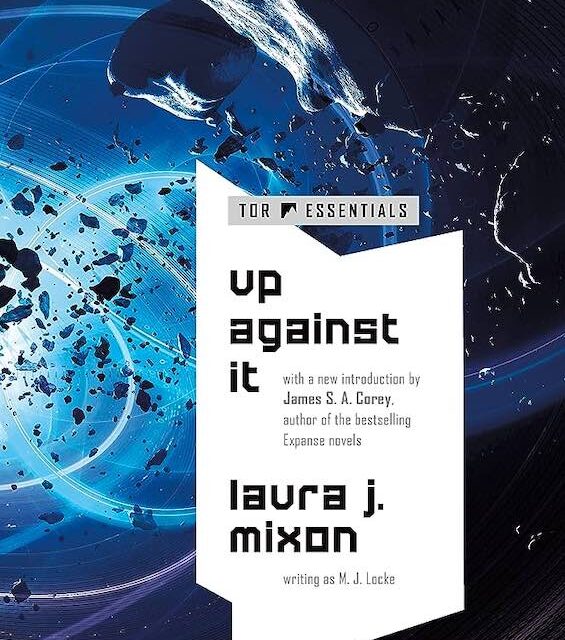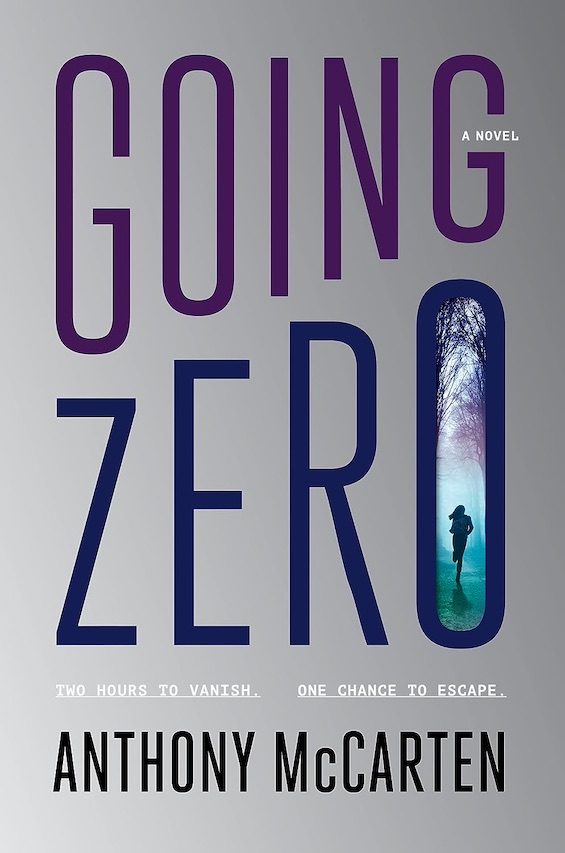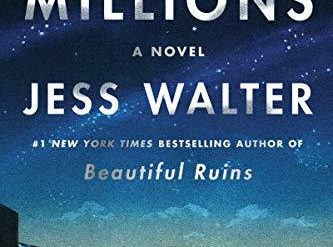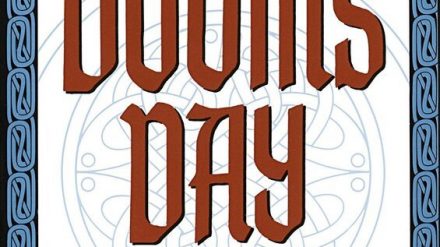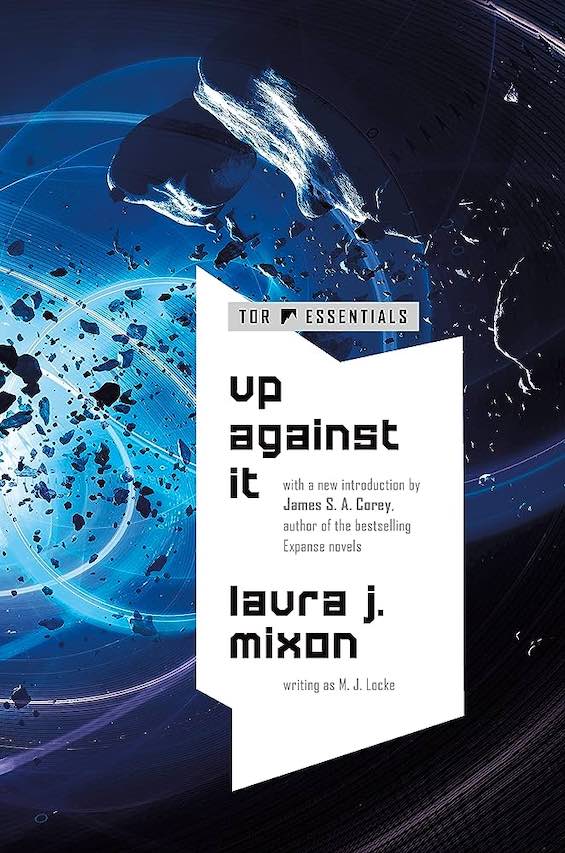
Estimated reading time: 5 minutes
Why do some novels win Hugo or Nebula Awards while thousands of others don’t? Is it because they’re the “best?” Of course not. You and I know better than that. Like the Academy Awards or those in any other field, other factors enter the picture. Sometimes, how long the authors have been writing, how well known they are, and whether they’ve never won the awards before and “deserve” to win at last. Other times, the author’s, or the author’s agent’s, connections make the difference. The upshot is that some truly brilliant books are entirely overlooked in awards season. And Laura J. Mixon’s 2011 sci-fi mystery mashup, Up Against It, is an outstanding example of a novel that should have won both the Hugo and the Nebula. It’s that good.
“An astonishing density of ideas”
Up Against It is a mystery. A murder mystery, in fact. But this is no formulaic whodunit contrived to fit an exotic setting in space. It’s a genuine mystery that derives from the futuristic setting of the novel. And Up Against It is hard science fiction written by an engineer. Yet at the same time it’s one of the most successful works of the imagination I’ve come across in years. In his foreword to the reissued edition of the novel, the writing team that call themselves James S. A. Corey refers to its “astonishing density of ideas.” Every few pages you’ll stumble upon some new theme or concept that could well be the basis for a novel in itself. But Mixon just tosses them all into the mix and moves along, wrapping “them all up in a fantastically readable mystery that keeps the tension up to the end” (to quote Corey again).
Up Against It by Laura J. Mixon (2011) 416 pages ★★★★★
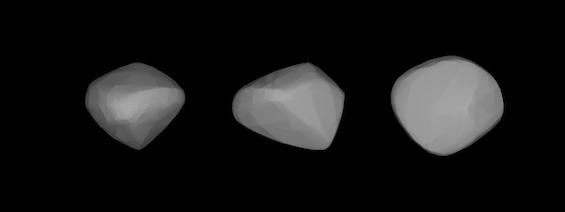
An insightful portrayal of politics in a crisis
The action in Up Against It unfolds on the asteroid 25 Phocaea—yes, it exists—and in its nearby space. Some 200,000 people live there in the vast underground city that has been burrowed into the rock. It’s the largest of the settlements in the asteroid belt, but the numbers pale beside the millions living on Mars by the turn of the 25th century.
The theme underlying the action is politics. Up Against It offers an insightful portrayal of politics in the raw—not the simplistic stuff of civics books but an unvarnished picture of the behind-the-scenes give-and-take that informs all government decision-making. Laura Mixon obviously knows how things work in the real world. (I was involved in the game for many years, back when anyone could still refer to politics as a game with a straight face.)
The characters in the novel, all of them human (with one exception), come across as entirely believable people. They get tired, frustrated, angry, vindictive, and violent, demonstrating all the traits that come into play in a crisis. But the character who steals the show isn’t human. It’s a feral AI (called a “sapient”) with the moral code of a newborn baby. Read the book. If you enjoy science fiction, especially hard SF, you’ll love it.
About the author
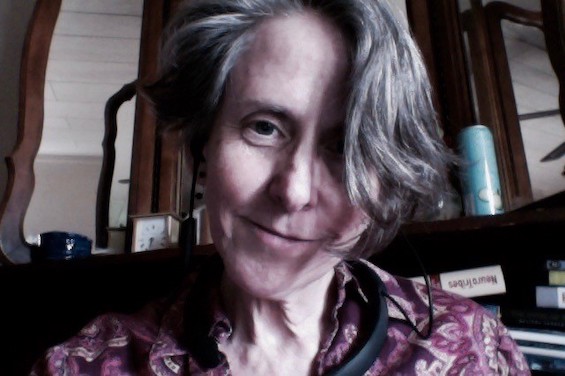
Laura J. Mixon asks on her author website, “Who is Laura J. Mixon? A nerd. An environmental engineer with a master of science in sustainability management, and over 35 years of experience providing environmental and information management services to industry and government. I have done auditing and investigative work on pollution sources. I’ve designed apps and managed rollout of integrated management systems to track pollutant emissions and reduce landfill waste, and water and energy use.
“I’m also a science fiction writer: a spinner of far-flung tales—stories of interstellar travel, planetary disasters, spaceships, rogue AI’s, planet-eating machines, sentient tumors… and the people who struggle to survive on the fringes of the world. I have six books out, as well as a handful of shorter works.”
Mixon’s Wikipedia entry reveals that she was born in 1957. In the 1980s, she took a break from work and served as a Peace Corps Volunteer in East Africa. Mixon is married to the science fiction writer Stephen J. Gould. She often publishes under the pen name Morgan J. Locke.
For related reading
Far sooner than any venture to the stars, the people of Earth will undertake mining in the asteroid belt for water, methane, and scarce metals—precisely as reflected in this novel. And I’ve reviewed two other books on the topic: Delta-V (Delta-V #1 of 2) by Daniel Suarez (A brilliant hard science fiction novel about asteroid mining) and Critical Mass – Delta-V #2 of 2 (This is humanity’s future in space).
For more good reading, check out:
- These novels won both Hugo and Nebula Awards
- The ultimate guide to the all-time best science fiction novels
- The top science fiction novels
- 10 new science fiction authors worth reading now
- Good books about space travel
And you can always find my most popular reviews, and the most recent ones, on the Home Page.

